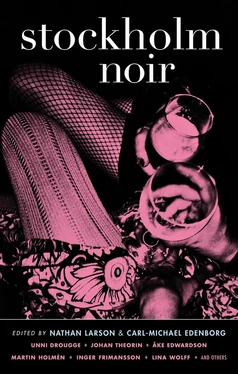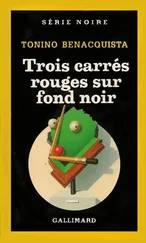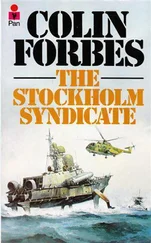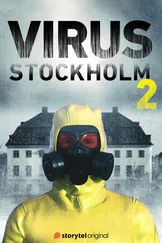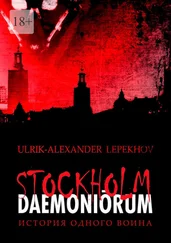Caroline Åberg - Stockholm Noir
Здесь есть возможность читать онлайн «Caroline Åberg - Stockholm Noir» весь текст электронной книги совершенно бесплатно (целиком полную версию без сокращений). В некоторых случаях можно слушать аудио, скачать через торрент в формате fb2 и присутствует краткое содержание. Город: New York, Год выпуска: 2016, ISBN: 2016, Издательство: Akashic Books, Жанр: Детектив, на английском языке. Описание произведения, (предисловие) а так же отзывы посетителей доступны на портале библиотеки ЛибКат.
- Название:Stockholm Noir
- Автор:
- Издательство:Akashic Books
- Жанр:
- Год:2016
- Город:New York
- ISBN:978-1-61775-297-1
- Рейтинг книги:3 / 5. Голосов: 1
-
Избранное:Добавить в избранное
- Отзывы:
-
Ваша оценка:
- 60
- 1
- 2
- 3
- 4
- 5
Stockholm Noir: краткое содержание, описание и аннотация
Предлагаем к чтению аннотацию, описание, краткое содержание или предисловие (зависит от того, что написал сам автор книги «Stockholm Noir»). Если вы не нашли необходимую информацию о книге — напишите в комментариях, мы постараемся отыскать её.
Copenhagen Noir
Helsinki Noir
Stockholm Noir — читать онлайн бесплатно полную книгу (весь текст) целиком
Ниже представлен текст книги, разбитый по страницам. Система сохранения места последней прочитанной страницы, позволяет с удобством читать онлайн бесплатно книгу «Stockholm Noir», без необходимости каждый раз заново искать на чём Вы остановились. Поставьте закладку, и сможете в любой момент перейти на страницу, на которой закончили чтение.
Интервал:
Закладка:
They were the same words she’d read on the poster at the scene of the accident. But when Rafel sang it with his sensual and full-bodied voice, it didn’t sound banal at all. His voice wound itself around Berit and made her stand up straight, as if rooted to the spot.
When Rafel let the last chord fade away, he got up and went into the trailer, quickly returning without the guitar. He walked straight toward her, his long wavy hair flowing over his broad shoulders, his oilcloth coat open, his hips swinging freely.
Rafel said nothing at all when he stood half a meter from her, nothing when he bent forward with parted lips and beautiful, half-open eyes.
Never had Berit been kissed in this way. It wasn’t only the sugar cube that dissolved between their tongues and made the kiss sweet. Never had a tongue been so soft and rubbed so easily against hers. No lips had so encircled hers and been as easy to meet as his. And somewhere down in his throat lived a singing voice that could take her to the end of the earth.
Rafel led her to the cliff that dropped down into the black water. Behind them rose a group of high-rises on the fringes of this no-man’s-land run wild. From there, occupants could look out over streams and bays and the entrance to the harbor. There the inhabitants of this Venice of the North could huddle up in their houses, gaze out wistfully through their windows, and dream of the far-off summer when they could sail away to the archipelago’s flower baskets.
Rafel and Berit stood on the edge of the cliff. They saw the cars’ headlights creep along the highway like glowworms, saw the glitter from the floating pleasure palaces on their way east, and the gossamer shimmer from the buildings of the city center. It was an amazing view. A wide cloud of mist covered Stockholm like a blanket of whipped cream, and above it the spires of various churches stuck up like candles on a cake.
Berit thought she saw everything as it was. The sky sparkled with a warm fluorescent sheen, and beneath her feet purple and green brooks billowed below the precipice to join the pitch-black canal in a beautiful paisley pattern. It was exactly the same pattern as her father’s scarf. The paisley scarf was one thing he’d cherished, it was always around his neck, even after he’d begun his life as a homeless wanderer.
Rafel walked back a few steps.
— Do you want to be my friend? My personal angel? he asked in a rasping yet sonorous voice, as if singing the phrase.
— Angel? Berit repeated, and imagined she saw the thick white fog spread a pair of wings.
— Death’s angel. Death alone is our friend.
The words flew away and dissolved before she’d caught their meaning. Instead, other words rose within her. Always be on guard. Believe only what you see with your own eyes. She turned around right as the tall figure came rushing toward her, and quickly threw herself to the side. The thick blanket of fog seemed illuminated from within, the light so white that she was blinded. And there — in stark contrast to the fog — was the sharp outline of a big black bat that immediately vanished. Only contours remained, like a piece removed from a completed jigsaw puzzle. She caught the fleeting impression of a hard wind blowing through the hole until the fog closed around it, erased it.
Berit was still sitting on the cliff. The cars’ yellow eyes swept forth below on the main road, but with growing distance until everything went dark. She realized that she was freezing, got up, pulled her coat more tightly around her, and slowly walked one last time through the motley, messy neighborhood where she could once dream herself away from ostentatious civilization. The lights from the shacks and workshops were off, the fires no longer burned. One solitary man with a halting gait walked forward in the rubbish, occasionally bending his neck toward the ground, like a pecking bird. A murder of crows flew from the spot where Berit had first seen a young person die. The poster with Rafel’s lyrics was still there. The first line went right through her: Who were you?
Now she knew.
But death wasn’t a friend. And Berit was no angel.
Over the next few days Berit scrutinized the newspapers, but there was nothing about a man who’d dropped from a great height and lost his life. She neither saw nor heard anything about Rafel anymore. And she never learned if Thea had been trying to protect her. She packed her bag and turned her back on the past. This was how Berit lived, in order to stay alive. She could have gone to the police, but they probably would have believed that it was all in her imagination, and maybe it was. That a couple of scruffy young things, under the influence of LSD, took their idol’s word that they could fly — this would soon be trumped by police work of considerably higher priority, namely the hunt for the man who’d murdered the country’s prime minister. And the tide of time, which is often called progress, swept away the cluster of sheet-iron hovels and illegal workshops in South Hammarby Harbor, for the location proved attractive to a new population. The toxic ground was cleaned up and then came social engineering. Renovated houses with magnificent views went up over the canal, built at a frenzied pace for a growing and socioeconomically homogeneous group of careerists within the burgeoning industries, for which the political and technological new order paved the way. Schools, day care centers, cafés, restaurants, and finely calibrated establishments for the elderly and disabled were built for the resourceful inhabitants. Freedom got a new meaning; its battle cry was, Bet on yourself! The shuttered lightbulb factory was lit up by a TV production company that delivered advertising-financed entertainment to the masses and generous profits to the owners. Being rich was no longer judged harshly, and those who didn’t grow rich only had themselves to blame. Those who now had to blame themselves were housed in the far-off suburbs’ symmetrical storage closets, a safe distance from the exclusive environs along the Hammarby Canal. That a sanctuary for the maladjusted had once been situated there was unimaginable.
Sometimes this tidy enclave is still haunted. You know it by a shiver in the hazy air at the hour of the wolf, when the long winter is on its way; it can come rumbling from the soul of a PR consultant who, despite Bikram Yoga and Celexa, feels encumbered by his own success. Through the big picture window with a “seaside view,” the silhouette of a large bat quickly appears and evokes the yearning to be out and away. Far, far away.
As if death were a friend.
10/09/03
by Nathan Larson
Kungsträdgården
08/09/03
Crap coffee bar, doing my best to hail the Swedish girl behind the counter, the blonde with the ponytail over by the cash register picking at her nails... But this dirty Iraqi or Pakistani or whatever she is won’t get out of my way.
Her saying, “Another Americano?”
For a moment I think she’s asking if I’m an American, and I nearly smack her filthy fucking face. Yes, her Swedish is street garbage, but it’s more that I’m not accustomed to these new names for a fucking cup of coffee.
“Yes. Tusen tack ,” I say to her, and smile big... though I would love to pretend to not understand her suburban accent.
However. Last thing I want is to be remembered, so the modus is — keep it cordial, and bland.
I’m working today.
Now. Generally speaking, when it comes to an everyday kinda political hit like this one, usually in some asshole or armpit like Bratislava or any of the former Yugoslav territories (take your pick)... generally, I couldn’t be fucking bothered.
Farm it out locally, or if that’s not viable, fly down some disposable thug, and be done with it. You could say my job is more administrative than anything else. But in this instance, it’s different.
Читать дальшеИнтервал:
Закладка:
Похожие книги на «Stockholm Noir»
Представляем Вашему вниманию похожие книги на «Stockholm Noir» списком для выбора. Мы отобрали схожую по названию и смыслу литературу в надежде предоставить читателям больше вариантов отыскать новые, интересные, ещё непрочитанные произведения.
Обсуждение, отзывы о книге «Stockholm Noir» и просто собственные мнения читателей. Оставьте ваши комментарии, напишите, что Вы думаете о произведении, его смысле или главных героях. Укажите что конкретно понравилось, а что нет, и почему Вы так считаете.
